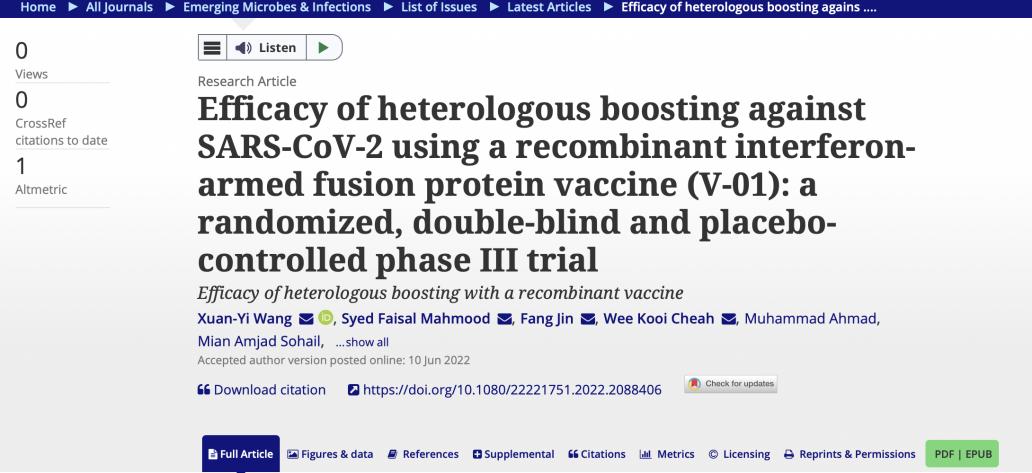Phase III trial results of the V-01 vaccine published in EMI showed its superiority in heterologous boosting
- Time of issue:2022-06-14 21:55
(Summary description)On June 10, a paper about the recombinant SARS-CoV-2 fusion protein vaccine (V-01) was published in the Emerging Microbes & Infections (EMI). In the latest phase III clinical trial, a dramatic increase of neutralizing antibody titers was measured in the V-01 group primed with inactivated vaccines 14 days after boosting. The trial results proved that, as a heterologous booster, V-01 was safe, efficacious, and could elicit robust humoral immunity during the pandemic of the Omicron variant. This double-blind, placebo-controlled, and randomized phase III clinical trial was conducted in Pakistan and Malaysia, aimed to assess the efficacy, immunogenicity, and safety of heterologous boosting with one dose of V-01 within 3-6 months after the completion of primary vaccination. The study was registered with ClinicalTrials.gov (number: NCT05096832). It is well known that heterologous boosters can be more immunogenic than homologous boosters, and can increase the intensity, sustainability, and breadth of immune responses. As expected, heterologous V-01 booster in participants elicited a robust virus-neutralizing antibody response, with a geometric mean titer (GMT) of 1452.8 at 14 days after boosting. It was also proven to be significantly safer than mRNA vaccines and the adenovirus vaccine of Oxford/AstraZeneca (AZ). Findings from this heterologous booster trial should be considered to further optimize the immunization schedule and strategy for the control of COVID-19. According to previous press reports, V-01 is the world's first COVID-19 vaccine that has demonstrated the efficacy of heterologous boosting in a randomized, double-blind phase III clinical trial conducted in more than one healthcare center against epidemic strains including Omicron, and that has obtained data about the protective efficacy against mild or severer Omicron infections. The V-01 vaccine can elicit protection quickly after administration, and it provides as good efficacy of heterologous boosting and primary immunization as mRNA vaccines and AZ adenovirus vaccine for at-risk populations. EMI is a peer-reviewed open access journal committed to publishing best and latest research results on emerging infectious diseases. The journal has academician Wen Yumei from Fudan University and professor Hans-Dieter Klenk from the University of Marburg as the co-editors-in-chief, and professor Lu Shan from University of Massachusetts Medical School as the executive editor. Associate editors of this journal include academician Xu Jianguo from Chinese Center for Disease Control and Prevention, professor Yuan Zhenghong from Fudan University, professor Tang Yiwei from Memorial Sloan-Kettering Cancer Center, Cornell University, professor Zhang Wenhong from Huashan Hospital affiliated to Fudan University, and professor Lorne A. Babiuk from the University of Alberta. References: 1. Xuan-Yi Wang, Syed Faisal Mahmood, Fang Jin, Wee Kooi Cheah, Muhammad Ahmad, Mian Amjad Sohail, Waheed Ahmad, Vijaya K Suppan, Muneeba Ahsan Sayeed, Shobha Luxmi, Aik-Howe Teo, Li Yuan Lee, Yang-Yang Qi, Rong-Juan Pei, Wei Deng, Zhong-Hui Xu, Jia-Ming Yang, Yan Zhang, Wu-Xiang Guan & Xiong Yu (2022) Efficacy of heterologous boosting against SARS-CoV-2 using a recombinant interferon-armed fusion protein vaccine (V-01): a randomized, double-blind and placebo-controlled phase III trial, Emerging Microbes & Infections, DOI: 10.1080/22221751.2022.2088406 Link: https://doi.org/10.1080/22221751.2022.2088406 Keywords: V-01, efficacy, heterologous boosting, subunit vaccine, phase III clinical trial Source: Cailian Press
Phase III trial results of the V-01 vaccine published in EMI showed its superiority in heterologous boosting
(Summary description)On June 10, a paper about the recombinant SARS-CoV-2 fusion protein vaccine (V-01) was published in the Emerging Microbes & Infections (EMI). In the latest phase III clinical trial, a dramatic increase of neutralizing antibody titers was measured in the V-01 group primed with inactivated vaccines 14 days after boosting. The trial results proved that, as a heterologous booster, V-01 was safe, efficacious, and could elicit robust humoral immunity during the pandemic of the Omicron variant.
This double-blind, placebo-controlled, and randomized phase III clinical trial was conducted in Pakistan and Malaysia, aimed to assess the efficacy, immunogenicity, and safety of heterologous boosting with one dose of V-01 within 3-6 months after the completion of primary vaccination. The study was registered with ClinicalTrials.gov (number: NCT05096832).
It is well known that heterologous boosters can be more immunogenic than homologous boosters, and can increase the intensity, sustainability, and breadth of immune responses. As expected, heterologous V-01 booster in participants elicited a robust virus-neutralizing antibody response, with a geometric mean titer (GMT) of 1452.8 at 14 days after boosting. It was also proven to be significantly safer than mRNA vaccines and the adenovirus vaccine of Oxford/AstraZeneca (AZ).
Findings from this heterologous booster trial should be considered to further optimize the immunization schedule and strategy for the control of COVID-19.
According to previous press reports, V-01 is the world's first COVID-19 vaccine that has demonstrated the efficacy of heterologous boosting in a randomized, double-blind phase III clinical trial conducted in more than one healthcare center against epidemic strains including Omicron, and that has obtained data about the protective efficacy against mild or severer Omicron infections. The V-01 vaccine can elicit protection quickly after administration, and it provides as good efficacy of heterologous boosting and primary immunization as mRNA vaccines and AZ adenovirus vaccine for at-risk populations.
EMI is a peer-reviewed open access journal committed to publishing best and latest research results on emerging infectious diseases. The journal has academician Wen Yumei from Fudan University and professor Hans-Dieter Klenk from the University of Marburg as the co-editors-in-chief, and professor Lu Shan from University of Massachusetts Medical School as the executive editor. Associate editors of this journal include academician Xu Jianguo from Chinese Center for Disease Control and Prevention, professor Yuan Zhenghong from Fudan University, professor Tang Yiwei from Memorial Sloan-Kettering Cancer Center, Cornell University, professor Zhang Wenhong from Huashan Hospital affiliated to Fudan University, and professor Lorne A. Babiuk from the University of Alberta.
References:
1. Xuan-Yi Wang, Syed Faisal Mahmood, Fang Jin, Wee Kooi Cheah, Muhammad Ahmad, Mian Amjad Sohail, Waheed Ahmad, Vijaya K Suppan, Muneeba Ahsan Sayeed, Shobha Luxmi, Aik-Howe Teo, Li Yuan Lee, Yang-Yang Qi, Rong-Juan Pei, Wei Deng, Zhong-Hui Xu, Jia-Ming Yang, Yan Zhang, Wu-Xiang Guan & Xiong Yu (2022) Efficacy of heterologous boosting against SARS-CoV-2 using a recombinant interferon-armed fusion protein vaccine (V-01): a randomized, double-blind and placebo-controlled phase III trial, Emerging Microbes & Infections, DOI: 10.1080/22221751.2022.2088406
Link:
https://doi.org/10.1080/22221751.2022.2088406
Keywords: V-01, efficacy, heterologous boosting, subunit vaccine, phase III clinical trial
Source: Cailian Press
- Time of issue:2022-06-14 21:55
- Views:
On June 10, a paper about the recombinant SARS-CoV-2 fusion protein vaccine (V-01) was published in the Emerging Microbes & Infections (EMI). In the latest phase III clinical trial, a dramatic increase of neutralizing antibody titers was measured in the V-01 group primed with inactivated vaccines 14 days after boosting. The trial results proved that, as a heterologous booster, V-01 was safe, efficacious, and could elicit robust humoral immunity during the pandemic of the Omicron variant.

This double-blind, placebo-controlled, and randomized phase III clinical trial was conducted in Pakistan and Malaysia, aimed to assess the efficacy, immunogenicity, and safety of heterologous boosting with one dose of V-01 within 3-6 months after the completion of primary vaccination. The study was registered with ClinicalTrials.gov (number: NCT05096832).
It is well known that heterologous boosters can be more immunogenic than homologous boosters, and can increase the intensity, sustainability, and breadth of immune responses. As expected, heterologous V-01 booster in participants elicited a robust virus-neutralizing antibody response, with a geometric mean titer (GMT) of 1452.8 at 14 days after boosting. It was also proven to be significantly safer than mRNA vaccines and the adenovirus vaccine of Oxford/AstraZeneca (AZ).
Findings from this heterologous booster trial should be considered to further optimize the immunization schedule and strategy for the control of COVID-19.
According to previous press reports, V-01 is the world's first COVID-19 vaccine that has demonstrated the efficacy of heterologous boosting in a randomized, double-blind phase III clinical trial conducted in more than one healthcare center against epidemic strains including Omicron, and that has obtained data about the protective efficacy against mild or severer Omicron infections. The V-01 vaccine can elicit protection quickly after administration, and it provides as good efficacy of heterologous boosting and primary immunization as mRNA vaccines and AZ adenovirus vaccine for at-risk populations.
EMI is a peer-reviewed open access journal committed to publishing best and latest research results on emerging infectious diseases. The journal has academician Wen Yumei from Fudan University and professor Hans-Dieter Klenk from the University of Marburg as the co-editors-in-chief, and professor Lu Shan from University of Massachusetts Medical School as the executive editor. Associate editors of this journal include academician Xu Jianguo from Chinese Center for Disease Control and Prevention, professor Yuan Zhenghong from Fudan University, professor Tang Yiwei from Memorial Sloan-Kettering Cancer Center, Cornell University, professor Zhang Wenhong from Huashan Hospital affiliated to Fudan University, and professor Lorne A. Babiuk from the University of Alberta.
References:
1. Xuan-Yi Wang, Syed Faisal Mahmood, Fang Jin, Wee Kooi Cheah, Muhammad Ahmad, Mian Amjad Sohail, Waheed Ahmad, Vijaya K Suppan, Muneeba Ahsan Sayeed, Shobha Luxmi, Aik-Howe Teo, Li Yuan Lee, Yang-Yang Qi, Rong-Juan Pei, Wei Deng, Zhong-Hui Xu, Jia-Ming Yang, Yan Zhang, Wu-Xiang Guan & Xiong Yu (2022) Efficacy of heterologous boosting against SARS-CoV-2 using a recombinant interferon-armed fusion protein vaccine (V-01): a randomized, double-blind and placebo-controlled phase III trial, Emerging Microbes & Infections, DOI: 10.1080/22221751.2022.2088406
Link:
https://doi.org/10.1080/22221751.2022.2088406
Keywords: V-01, efficacy, heterologous boosting, subunit vaccine, phase III clinical trial
Source: Cailian Press
Scan the QR code to read on your phone
Quick Navigation
Service Hotline
Quick
Navigation
Service
Hotline

Official WeChat Official Account
Copyright © Joincare Pharmaceutical Group Industry Co., Ltd. All Rights Reserved. Powered by:www.300.cn Zhuhai 粤ICP备14024104号






